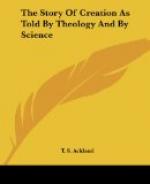In considering these theories, our attention must first be directed to some defects which appear to weaken the whole course of the argument; and then we may consider the peculiar difficulties in the way of the processes of natural and sexual selection; and the grounds for the belief that man is in possession of something entirely different in kind from any faculty or power possessed by any lower animals, which could not therefore be derived by inheritance and improvement.
The first thing which strikes us in Mr. Darwin’s works is that, from time to time, he betrays a sort of latent consciousness that his theory is insufficient; that the processes to which he ascribes such vast results are not quite adequate to the purpose, but that they need in some way to be supplemented. Every now and then recourse is had to some law—some unknown cause—which must co-operate in the production of the results he is considering. In spite of the apparent care which he has taken to guard against it, he is continually betrayed into a confusion between the two senses in which the word “law” is employed. In its proper significance, law is an expression of the will of an intelligent superior, enforced by adequate power. In this sense the law may be considered as an efficient cause. The combination of will and power is an adequate cause for any result whatever. But Mr. Darwin expressly excludes this sense of the word, in a sentence which seems to involve a self-contradiction. “I mean by nature only the aggregate action and product of many natural laws, and by law only the ascertained sequence of events.” [Footnote: Plants and Animals under Domestication, vol. i. p. 6.] Law, in this sense, then, is simply the statement of observed facts, and as such can have no action at all. It asserts that certain phenomena do uniformly follow each other in an ascertained order; but it gives us no information whatever as to the cause of those events, or the reason why they do thus succeed each other. But, taking law in this last sense, by his own definition, Mr. Darwin does, nevertheless, continually bring forward certain “laws” as accounting for certain results. Thus, we have the laws of “Correlation of Growth,” [Footnote: Origin of Species, ed. 1872, p. 114.] “Inheritance limited to Males,” [Footnote: Descent of Man, vol. i. pp. 256, 257.] and a “Principle of Compensation.” [Footnote: Origin of Species, p. 117.] When Mr. Darwin, therefore, brings forward these laws as efficient causes, he not only tacitly admits the inadequacy of his theory to account for the phenomena in question, but he also endeavours to supply the defect by another cause, which, by his own definition, is no cause at all. And further, Mr. Darwin calls in the action of “unknown agencies.” [Footnote: Descent of Man, vol. i. p. 154.]




